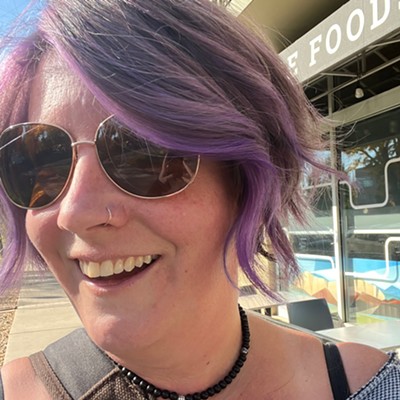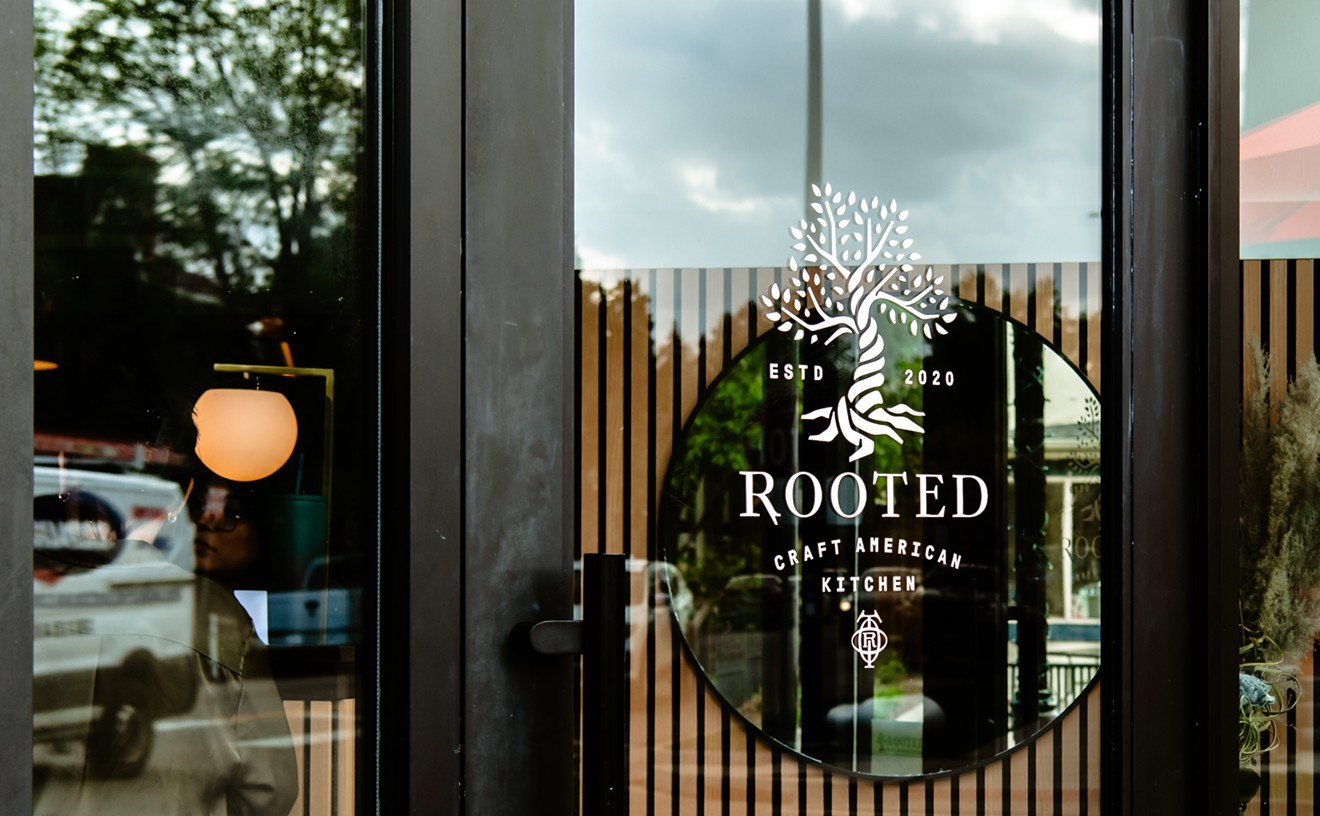To make the perfect bagel, you need three key components: a great recipe, a flexible process managed by a knowledgeable bagel maker, and New York water, says Joshua Pollack. That's a very specific formula, but it seems accurate — at least judging from the customers who wait in winding lines at Rosenberg's Bagels & Delicatessen. Last month, sixty people rushed over after the Facebook announcement that Pollack's place was finally open: Denver has been waiting a long time for a good bagel. See also: Behind the Scenes at Rosenberg's Bagels & Delicatessen
"I thought they were really good," says Rachel McKim, a New Jersey native who now lives in San Francisco and had just chowed down an egg-and-cheese bagel sandwich. "They were chewy on the inside and could have been a little crunchier on the outside. But the best in the West Coast so far."Pollack would agree that his bagels aren't yet perfect: He's still trying to master the "roll with a hole," he says, which is achieved when the bottom and the top look identical. But he's done a lot of research, and spent a lot of money, to get his bagels as close to perfection as possible.
Pollack grew up in Bergen County, New Jersey, just across the Hudson River from New York City, and lived off kosher-style bagels from neighborhood delis, including Ronnie's Hot Bagels and Cafe, which was about a mile from his house. The owner there would give neighborhood kids bagels whenever they got As on their report cards. Pollack named a sandwich after that philanthropist: Ronnie's Favorite, which tops a bagel with dill cream cheese, cucumber, Scottish smoked salmon and whitefish salad. "Without him, I don't know if I would have done this," says Pollack.
When he decided to leave a career in the finance industry and dive into the bagel biz, Pollack went to northern New Jersey to work with his mentor, Bobby Shorr, who owns Harold's Kosher Deli and a number of Bagel Emporiums. Pollack had worked at the deli as a teenager and was paid in food, which he took with him when he enrolled at the University of Colorado at Boulder. "I was the most popular kid in the dorms, with bagels, lox and corned beef," he remembers.
When he returned to Jersey in 2012, he worked at Shorr's Bagel Emporium in search of knowledge, not free food. "Even though [making bagels is] a science, you do need to feel it out. Every situation is different. It could be hotter or more humid, and you have to adjust," says Pollack. "But working next to these guys who've been doing it for thirty years made me more comfortable. There's stuff that you can't read in a book."Carrying hundred-year-old recipes from Harold's and another classic bagel place, Goldberg's, Pollack returned to Colorado and enrolled at the Cook Street School of Fine Cooking, where he created his own recipe. But the right recipe alone won't make a perfect bagel: Pollack knew that people had tried making New York-style bagels and pizza in Denver for decades and had trouble mastering the dough. "People have heard for years that pizza and bagels are better in New York because of the water, and I wanted to get to the bottom of it," he says.
So he got permission from New York and New Jersey water-treatment facilities to take samples of their water, and shipped them to Colorado State University for testing. A couple of weeks and $40 later, he had the molecular structure of New York's water. And it was, in fact, different from Denver's water in a few ways that were significant to baking.
Generally, because New York's water is treated with UV light and fewer sediment filters, it has more TDS, or total dissolved solids — which simply means it has more minerals, Pollack says. He researched those minerals and found that two dominant ones affect the baking process: calcium and magnesium, "super glutens" that enhance the strength of gluten. "Bagels and pizza dough are the most gluten-heavy dough," he explains. "Without that strong gluten, the crust would crack."
There are magnesium- and calcium-rich flours, and some businesses will actually ship out New York water, but Pollack wasn't interested in either option. "I figure you might as well go traditional and not have to change the recipe," he says.
So he decided to build a system that would re-create New York water.
Keep reading for more on Rosenberg's Bagels & Delicatessen.
That proved to be challenging: He contacted well-known industrial water-system builders, and no one knew how to do it. Then he found local water-system engineer Chuck Waterman; after thirty minutes of conversation, Waterman got excited and said, "Let's go."The process wasn't cheap. Pollack won't reveal the exact cost of the system, but he says it took tens of thousands of dollars and six months to create the system, then another few months to build it. That explains why his prices are a bit steeper than those at the average bagel place. But he learned that people in Denver will pay for quality food when he started selling those bagels from a space at Gather, the cafe in Galvanize in the Golden Triangle. Armed with that knowledge, he started looking for a spot he could call his own. After two years and a lot of determined calling, he leased a storefront on Welton Street from the daughter of Charles Cousins, the late Five Points pioneer who owned many of the buildings in the area.
Pollack gave the deli his mother's maiden name. "It's an homage to her and her side of the family," explains Pollack, who lost his mother when he was seventeen. And here he's re-created not just the bagels he remembers from his childhood, but also great, gluten-y, classic deli food.
His meats don't just taste like New York; they are from New York. When Pollack was still at Gather, he was contacted by the Denver-dwelling grandson of the owners of Old World Provision, which supplies corned beef and other meats to mainstay New York delis. Today Rosenberg's beef and ham are the same as what's served in the heart of New York, while Pollack sources his turkey, pork and chicken locally. He also offers Taylor Ham, a hot-dog-like slab that is as much about nostalgia as taste for anyone who grew up with it.
All of the fish at Rosenberg's is smoked in-house (except the gravlax, which isn't smoked at all). The deli regularly stocks four types of salmon, plus black cod, chub, herring and whitefish, all of which Pollack gets from the Seattle Fish Company. His smoking process takes about three days. The fish are cured when they get to the restaurant, sit for a day to form an oily fat layer, and are then smoked. That fatty layer holds in the smoky flavor, and the fish are set to rest overnight so that flavor can spread through the flesh.
During its soft launch before the July 26 grand opening, Rosenberg's went through what Pollack had thought would be a month's supply of fish in three days. Given its popularity, he'll soon add a rotation of seafood from the technologically savvy Sea 2 Table, a company that collects texts from fishermen listing their latest catches, then sends the information to restaurants that then claim the fish. A shipping truck meets the fishermen at the wharf and delivers the catch to its correct destination. "It's conceivable that we'll get a fish the same day that it's caught," Pollack says.In addition to bagels and all their toppings and spreads (including caviar), Rosenberg's also serves breakfast sandwiches; housemade chicken, tuna, whitefish, egg and chopped-liver salads; kosher pickles; and classic Jewish pastries. Pollack brought in pastry chef Jay Thomas, formerly of the Inverness Hotel and Conference Center and Brown Palace Hotel; Thomas researched Jewish desserts to get their history as well as recipes, and talked with Pollack to glean taste tips from his memories.
Rosenberg's will soon add catering, and Pollack is hoping to introduce late-night fare and hours next year. But while pizza won't be on that menu, he's interested in sharing his authentic New York water with a pizza place that meets his East Coast expectations.
Follow @CafeWestword











